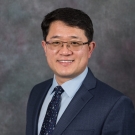
Abigail Humphries Returns to Where it All Began
Graduate student receives grant to improve outcomes for spina bifida at UC Davis, where she was treated for the condition as a newborn over 20 years ago
As a newborn from Auburn, Abigail Humphries was life-flighted to UC Davis Medical Center for complications related to spina bifida, a condition where the spinal cord fails to fuse properly in the womb. Nearly 20 years later, she's now a biomedical engineering graduate student working on a project funded by the National Institutes of Health, or NIH, to improve health outcomes of spina bifida at the University of California, Davis.

Yet, this isn't a full-circle moment for Humphries. It's a pivotal step in realizing a life's dream of giving back to the community that gave so much to her.
"I have known what I wanted to do since I was 5 and capable of understanding what my disability meant," she said, describing her drive to become a researcher. "I understood then how lucky I am to have been born with what I have and still be able to walk, run, bike and swim. I knew I wanted to do research and help the community that gave me my confidence and my sense of purpose."
Engineering a New Approach
Humphries' spina bifida research branches off of a project overseen by her advisors, Associate Professor of Biomedical Engineering Randy Carney and Professor of Biomedical Engineering and Surgery Aijun Wang. Their project, funded by the NIH's National Institute of Biomedical Imaging and Bioengineering, or NIBIB, explores a scalable microfluidic drug platform to treat cancer with engineered extracellular vesicles, nanoparticles released by all cells to share information, some of which are thought to promote therapeutic benefits across the body.
Humphries will use this drug platform to investigate how engineered extracellular vesicles, or EVs, could be used as a treatment for spina bifida. This aim builds on the findings of Wang's groundbreaking CuRe trial, which treated spina bifida with a bioengineered stem cell patch applied directly to the fetus' spinal opening while developing in the mother's womb. That project showed the stem cell patch released various entities, including EVs, as part of their therapeutic punch.
"I am hoping to engineer extracellular vesicles to see if we can administer them alone to create similar effects as the stem cell patch in the CuRe trial," she said, "and maybe prevent some of the more life-altering disease states you see in spina bifida, such as paralysis and neurogenic bowel and bladder."
To maximize the project's potential, Humphries will conduct this research on campus and at UC Davis School of Medicine, Shriners Children's Northern California — a hospital notable for its individualized care of patients with spina bifida — and the Institute for Pediatric Regenerative Medicine, a joint initiative of UC Davis School of Medicine and Shriners.
The Power of a Grant
Humphries couldn't pursue this effort without the Research Supplements to Promote Diversity in Health-Related Research Program grant she received from NIBIB.
The program is designed to provide additional support to ongoing research efforts like Wang and Carney's project, with funds going toward improving the diversity of students, postdoctoral researchers and eligible investigators.
"We are deeply appreciative of this funding opportunity from the NIH, which supports the development of researchers who have been historically underrepresented in science," Carney said.
For Humphries, who was also recently diagnosed with Type 1 diabetes, the grant is especially important as it enables her to focus more on her research and her health.
"A large portion of my day gets eaten up by having to take more precautions and care of my physical health than the average person would," she said. "With this funding, I will be able to spend more time on doing my classes and research."
"Abby's resilience and passion for advancing targeted treatments for central nervous system disorders, despite the health challenges she has faced, are truly inspiring," added Wang.
The hardships due to Abby's disability have never diminished her drive to be a researcher. She finds gratitude in the experience for giving her purpose and says it's a dream come true to pursue research with Carney and Wang as a key moment in her lifelong journey to improve health outcomes for spina bifida.
"I'm exactly where I'm supposed to be," Humphries said.






